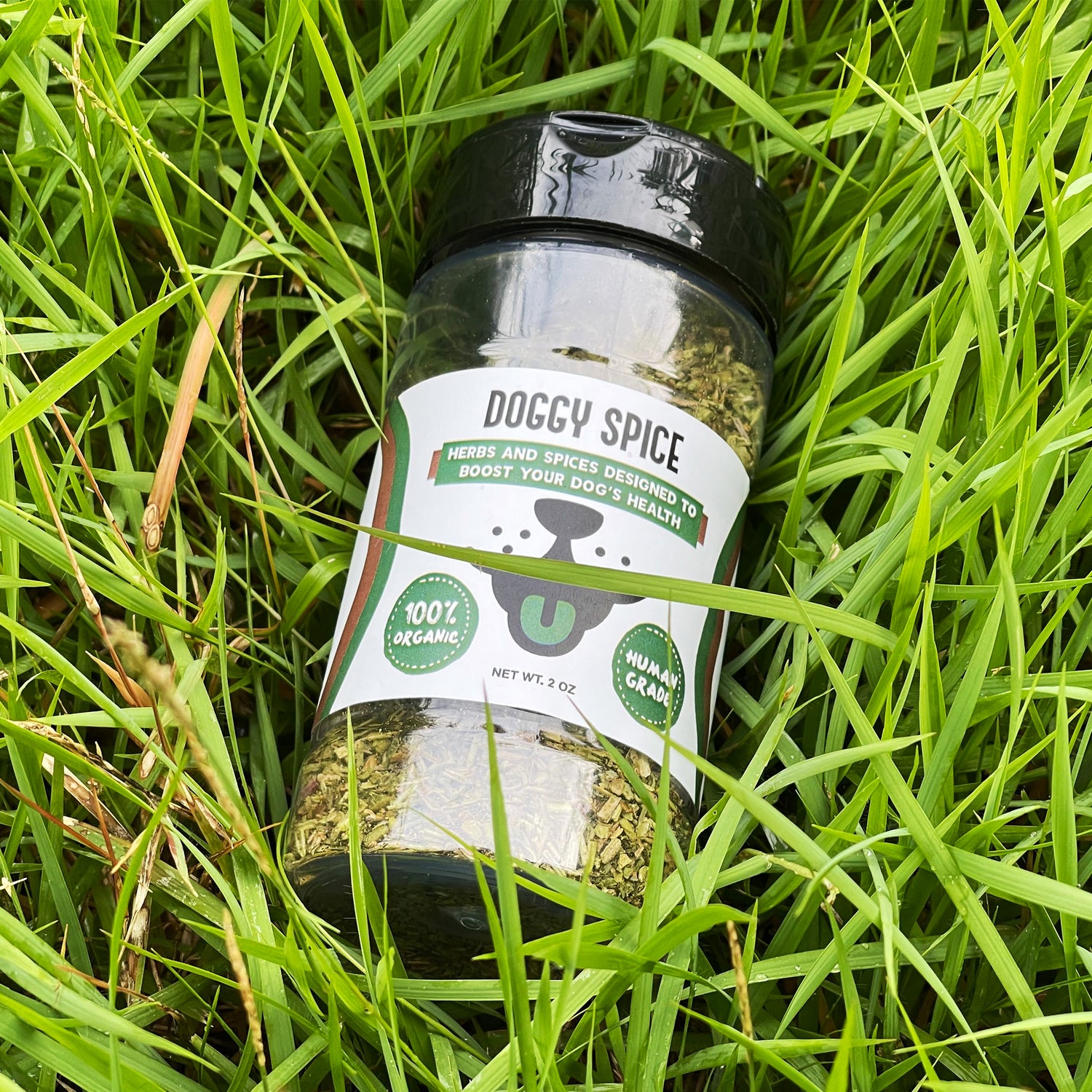
Safe Winter Herbs for Dogs: Health Benefits and Uses
Share
Introduction
As temperatures drop, it’s important to prioritize your dog’s health and immunity during the winter months. One simple way to support their well-being is by incorporating safe winter herbs into their diet 🌿. These herbs not only enhance flavor but also provide numerous health benefits for your furry friend.
In this guide, we’ll explore the best winter herbs for dogs, their benefits, how to use them safely, and common questions dog owners have about incorporating herbs into their pup’s routine.
Why Use Winter Herbs for Dogs?
Winter herbs can:
- Boost immunity 🛡️: Many herbs are rich in antioxidants and vitamins that support a strong immune system.
- Aid digestion 🐕: Certain herbs can soothe upset stomachs and promote gut health.
- Relieve inflammation 🔥: Anti-inflammatory properties in some herbs can ease joint pain and arthritis, which often worsen in colder months.
- Provide mental stimulation 🧠: The scents and flavors of herbs can keep your dog curious and engaged.
By adding herbs to your dog’s diet, you can naturally enhance their health during the winter season.
Top 7 Safe Winter Herbs for Dogs
-
Rosemary 🌿
- Benefits: Rosemary improves digestion, boosts memory, and supports the immune system.
- Uses: Sprinkle a small pinch over your dog’s food or bake it into homemade treats.
-
Thyme 🌱
- Benefits: Thyme acts as a natural antiseptic, supports respiratory health, and aids digestion.
- Uses: Add fresh or dried thyme to your dog’s meals in moderation.
-
Ginger 🫚
- Benefits: Ginger soothes upset stomachs, reduces nausea, and has anti-inflammatory properties.
- Uses: Grate fresh ginger and mix a tiny amount into their food or use powdered ginger in recipes.
-
Parsley 🌿
- Benefits: Parsley freshens breath, provides vitamin C, and supports urinary health.
- Uses: Chop fresh parsley and sprinkle it over meals.
-
Turmeric 🧡
- Benefits: Turmeric contains curcumin, which fights inflammation and supports joint health.
- Uses: Mix a pinch of turmeric with a healthy fat like coconut oil to enhance absorption.
-
Dill 🌿
- Benefits: Dill promotes digestion, reduces gas, and helps alleviate bad breath.
- Uses: Add a small amount of fresh dill to food as a garnish.
- Peppermint 🍃
- Benefits: Peppermint eases digestion and soothes minor stomach upsets.
- Uses: Brew a weak peppermint tea and offer it to your dog in small amounts.
How to Safely Use Herbs for Dogs
To ensure the safety of your dog, follow these tips:
- Start small 🥄: Introduce herbs in small quantities to monitor for any adverse reactions.
- Choose fresh or organic herbs 🌱: Avoid herbs treated with pesticides or additives.
- Avoid toxic herbs ⚠️: Steer clear of herbs like garlic, onion, and chives, which are harmful to dogs.
- Consult your vet 🏥: Always check with your veterinarian before introducing new herbs, especially if your dog has health conditions.
- Stick to recommended amounts 📏: Overuse of herbs can lead to upset stomachs or other issues. Use a herbal supplement like Doggy Spice to eliminate the worry of over serving your pup.
Health Benefits of Herbs: What Experts Say
“Herbs like turmeric and ginger provide natural anti-inflammatory benefits, which can be particularly helpful for dogs suffering from arthritis or other joint issues in colder months.”
— Dr. Lisa Matthews, DVM, Holistic Pet Care Specialist
DIY Winter Herb Recipes for Dogs
-
Herbal Bone Broth 🥣
Ingredients:
Instructions:
- Heat the broth and mix in the herbs.
- Allow it to cool before serving as a topper for meals.
-
Turmeric Golden Paste 💛
Ingredients:
- 1/4 cup turmeric powder
- 1/2 cup water
- 1 tbsp coconut oil
Instructions:
- Combine turmeric powder and water in a saucepan.
- Simmer until a paste forms, then stir in coconut oil.
- Add 1/4 tsp to your dog’s meals daily.
-
Minty Fresh Dog Biscuits 🦴
Ingredients:
- 1 cup oat flour
- 1/4 cup fresh mint leaves
- 1 egg
- 1 tbsp coconut oil
Instructions:
- Blend ingredients into a dough, roll it out, and cut into shapes.
- Bake at 350°F (175°C) for 15 minutes.
-
Winter Herb Dog Biscuits 🦴
Ingredients:
- 2 cups whole wheat flour (or a gluten-free alternative)
- 1/2 cup unsweetened applesauce
- 1 egg
- 1 tsp dried parsley
- 1 tsp dried dill
- 1/4 cup chicken or vegetable broth (low sodium)
Instructions:
- Preheat the oven to 350°F (175°C).
- Mix the flour, applesauce, egg, parsley, and dill in a large bowl.
- Gradually add the broth until the dough is firm but pliable.
- Roll out the dough and cut into shapes.
- Bake for 20–25 minutes or until golden brown.
- Cool completely before serving.
-
Herb-Infused Frozen Dog Treats ❄️
Ingredients:
- 1 cup plain yogurt (unsweetened, low-fat)
- 1 tbsp finely chopped fresh mint
- 1 tbsp finely chopped parsley
- 1/2 cup pureed pumpkin
Instructions:
- Combine yogurt, mint, parsley, and pumpkin in a bowl.
- Pour the mixture into silicone molds or ice cube trays.
- Freeze for 3–4 hours or until solid.
- Pop out the treats and store them in an airtight container in the freezer.
-
Winter Herb Bone Broth Cubes 🍖
Ingredients:
- 2 cups homemade chicken bone broth (ensure no onion or garlic)
- 1 tsp dried rosemary
- 1 tsp dried thyme
- 1 tsp dried chamomile
Instructions:
- Warm the bone broth and stir in the herbs.
- Let the mixture steep for 10 minutes, then strain out the herbs.
- Pour the broth into ice cube trays and freeze.
- Serve as a hydrating, herb-infused snack or meal topper.
-
Herb-Infused Oatmeal Treats 🌾
Ingredients:
- 1 cup rolled oats
- 1/2 cup peanut butter (unsweetened, no xylitol)
- 1 tbsp chopped fresh basil
- 1 tbsp chopped fresh dill
- 1/4 cup water
Instructions:
- Combine oats, peanut butter, basil, and dill in a bowl.
- Slowly add water until the mixture holds together.
- Roll into small balls or press into silicone molds.
- Refrigerate for at least 2 hours before serving.
Benefits of DIY Herb Treats for Dogs
- Customization: Adjust ingredients to suit your dog's dietary needs or preferences.
- Control Over Ingredients: Ensure only safe and natural items are included.
- Bonding Opportunity: Making treats is a great way to spend quality time with your dog.
These creative winter herb treats not only taste great but also deliver health benefits tailored to the season. Always introduce new treats gradually and monitor your dog for any signs of allergies or sensitivities.
Herbs for Dogs Frequently Asked Questions (FAQ) 🧐
What herbs are unsafe for dogs?
Avoid garlic, onion, chives, and nutmeg, as they are toxic to dogs.
Can I use dried herbs instead of fresh ones?
Yes, but reduce the quantity as dried herbs are more concentrated.
How much turmeric is safe for dogs?
A small dog can have 1/4 tsp daily, while larger dogs can have up to 1 tsp.
Are essential oils from herbs safe for dogs?
Essential oils should be avoided or used under veterinary guidance, as they can be toxic.
Can herbs cure illnesses in dogs?
While herbs can support health, they should not replace veterinary care for serious conditions.
Conclusion
Incorporating safe winter herbs into your dog’s diet is an easy and natural way to enhance their health during the colder months 🌟. Whether it’s boosting their immune system, soothing digestion, or alleviating joint pain, herbs like turmeric, rosemary, and parsley offer numerous benefits.
Always start small, consult your vet, and enjoy experimenting with these winter-friendly herbs to keep your pup happy and healthy.
References
- American Kennel Club. (n.d.). Herbs Safe for Dogs. Retrieved from akc.org.
- Veterinary Health Center. (n.d.). Natural Anti-Inflammatory Options for Dogs. Retrieved from vethealth.org.
- Canine Health Institute. (2023). Digestive Support Through Herbs.
- Matthews, L. (2022). Holistic Pet Care Guide.

